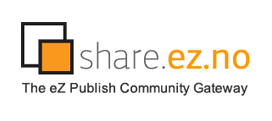Adding custom security policy limitations to your modules
Tuesday 25 May 2010 7:44:59 am
Defining our own limitations
Definition
As you probably noticed in the module.php example above, variable $FunctionList['myfunction'] is an empty array, which means that the function doesn't have any limitation. We just need to fill it with right values to add some.
Example for a language level limitation :
<?php
$Module = array('name' => 'mymodule');
$ViewList = array();
$ViewList['myview'] = array(
'script' => 'view.php',
'params' => array(),
'functions' => array( 'myfunction' )
);
$Language = array(
'name'=> 'Language',
'values'=> array(),
'path' => 'classes/',
'file' => 'ezcontentlanguage.php',
'class' => 'eZContentLanguage',
'function' => 'fetchLimitationList',
'parameter' => array( false )
);
$FunctionList['myfunction'] = array('Language' => $Language);Here we tell eZ Publish that myfunction has a limitation named Language and that we need to fetch possible values list with eZContentLanguage::fetchLimitationList() method, with parameter false. This simply stands for an old school way to define a callback function, probably here since first releases of eZ Publish 3 (remind you first versions of PHP4 and all its limitations). For curious minds, the important stuffs can be found in eZPolicyLimitation::allValuesAsArrayWithNames(), from line 249 (in a 4.3.0 eZ Publish instance).
Here we call a class from the kernel to fill our limitation array, but it is of course possible to use a class from an extension. However, autoload system cannot be used here and an old good include_once is made in the backend. So, in order to use a class from an extension, we need to add another key to our $Language array :
$Language = array(
'name' => 'Language',
'values' => array(),
'extension' => 'myextension',
'path' => 'classes/',
'file' => 'myclass.php',
'class' => 'MyClass',
'function' => 'fetchLanguageLimitationList',
'parameter' => array( false )
);This way, extension/myextension/classes/myclass.php class will be included.
What does our method MyClass:fetchLanguageLimitationList() have to return ? A quick look to eZContentLanguage::fetchLimitationList() shows us that it must be a simple array with each entry being an associative array itself containing id and name keys.
- id will be the value stored in the database for the security policy limitation
- name will simply be the label displayed in the admin interface
Here what should be our class MyClass :
class MyClass
{
/**
* Fetches the array with names and IDs of the languages used on the site. This method is used by the permission system.
*
* @return Array with names and IDs of the languages used on the site.
* @static
*/
public static function fetchLanguageLimitationList()
{
$langList = eZINI::instance( 'site.ini' )->variable( 'RegionalSettings', 'SiteLanguageList' );
$aResult = array();
foreach($langList as $lang)
{
if($lang)
{
$aResult[] = array(
'id' => $lang,
'name' => $lang
);
}
}
return $aResult;
}
}